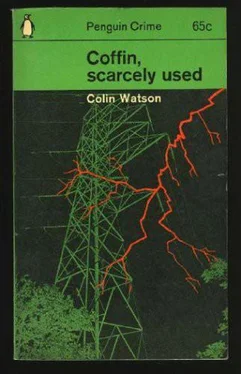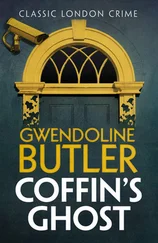Purbright tried to do so. “He wasn’t too well; was that it?” he asked.
“He was well enough,” retorted Mrs Poole, “but health never would have saved him. What was waiting for him didn’t take account of whether he came running or wheeled in a chair.”
Purbright remembered Lintz’s estimate of the housekeeper. “Just you tell me what you think happened to him, then,” he invited.
The woman frowned and carefully tapped the ash from her cigarette into an empty tea cup by her chair.
“I don’t know whether you believe in phenomenons,” she began, pausing to sharpen her regard of the inspector, “but it doesn’t matter if you do or don’t. There are such things, though they take a bit of understanding. Some spiritualists—and I don’t call myself that, mind—some say there’s nothing but good in what comes to us in that way. But never you believe them. It stands to sense that if the living’s good and bad mixed, then those who’ve passed over are two sorts as well. Only even more so, if you see what I mean.”
She left off to poke the small, smouldering fire, but seemed to expect no comment. “What we call possession,” she resumed, “is just the bad kind getting hold of someone here to be spiteful with. That’s all in books, so there’s no call for Mr Clever-pants Lintz to be so certain of himself. Not that he ever worried about his uncle’s troubles. There’s none so blind as those who won’t see. Mr Lintz never even noticed when it started in the summer. His uncle wasn’t as scared then as he got afterwards, of course, but I could have told you to the day when he first knew—Mr Gwill, I mean.”
Purbright found the flow of urgent, husky speech fascinating in spite of his sense of time being wasted on a woman half frightened, half hypnotized by her own fancies. He listened in silence, gazing first at one piece of furniture, then another, but avoiding now the eyes which had brightened with the fever-fire of psychic exposition.
“It all started a month to the day after that one”—she jabbed with her cigarette towards the wall beside her—“was put in his grave. He’d always been a quiet sort, had Mr Gwill, but dignified, you know. He didn’t show his feelings as a rule. But four weeks after the funeral from next door, I saw him trembling and clenching in the big room as if he’d got pneumonia. ‘Excuse me, sir,’ I said, ‘but are you feeling all right?’ He looked at me as if he’d never seen me before and shot straight out of the house. And he was never the same after that. Sometimes he was better, sometimes worse, but he couldn’t really settle.”
“I thought this man, Mr Carobleat, was a friend of his,” Purbright observed.
“A friend, sir?” Mrs Poole’s chubby mouth twisted in derision. “Him?”
“That’s only what I’ve been told.”
“Oh, they were thick enough at one time. That Mr Carobleat was always in and out. But he wasn’t Mr Gwill’s kind. I couldn’t stand him, he was that sly and for ever m’dear-ing me as if I was a barmaid or something. And he hung about so...”
Purbright looked back from contemplation of the dresser to catch Mrs Poole staring at the window behind him. “Yes,” he prompted, “go on.”
Mrs Poole straightened. She shook her head doubtfully. “I don’t think I should say any more, sir.”
Purbright waited but she remained silent.
At last he said, “You weren’t in the house last night, I understand.”
“No, sir. I’d gone over to my sister’s. I got the eight o’clock train back this morning.”
“Yes, I’m only sorry you could have had no warning. It must have been a shock.”
“Oh, the policeman here was very kind. He told me what...what had happened.” Mrs Poole delved into the bundle-like chair and drew out a small handkerchief, with which she nervously dabbed the end of her nose.
“Do you happen to know if Mr Gwill was worried about business affairs?”
Mrs Poole looked blank. “You’d have to ask Mr Lintz about that, sir.”
“He didn’t appear to think there was anything wrong.”
“Then there can’t have been, I suppose. Mr Gwill wouldn’t have said anything to me, in any case.”
“But he was upset about something?”
Again the woman’s eyes flickered towards the window. In a suddenly decisive tone she declared: “He was being pestered, sir, and that’s the top and bottom of it.”
The inspector leaned forward slightly. “By whom?”
“No one you could lay your hands on, sir.”
Back to where we started, Purbright told himself. “Would you say...” he said slowly, “...would you say that Mr Gwill knew precisely what he was doing when the accident happened?”
“Ac-cident?” The scornfully stressed first syllable expressed Mrs Poole’s opinion of people who supposed her late employer might ever have done anything save with reason and intention.
“You think,” suggested Purbright, “that he could have done what he did deliberately?”
Mrs Poole ground out her cigarette stub—it was surprisingly short, the inspector noticed—against the fire back, and flicked her fingers over her pinafore. “Not that, either,” she said. “He was trying to get away, that’s all. Poor soul,” she added, almost to herself.
Back again.
“Tell me, Mrs Poole, did Mr Gwill have any regular visitors?”
“Well, only the people you’d expect. Mr Lintz came sometimes, of course. He’d never stay for long, though. Not for meals. Then Mr Gloss came over occasionally, and...”
“Mr Gloss?”
“Yes, sir. The solicitor. He’d sometimes bring Dr Hillyard with him, but just as often the doctor came on his own.”
“Mr Gwill wasn’t having treatment, though?”
“Oh, no—at least, not as far as I know. The doctor came in the evenings. He’d usually stay for dinner. There were times when I served for him and Mr Gwill and Mr Gloss and Mr Bradlaw as well. The...the builder.”
Purbright noticed her reluctance to name Mr Bradlaw’s main occupation. “Those three gentlemen were personal friends of Mr Gwill, I take it.”
“They were, sir.”
“And no one else called here regularly?”
Mrs Poole did not reply for a few moments. Then she nodded towards the wall beyond which she had previously indicated “That one”, and said coldly: “Only her.”
“Mrs Carobleat?”
“Now and again. Once a week, maybe.”
“Another personal friend?” Purbright avoided putting the slightest emphasis on any of the three words.
“Not of mine,” Mrs Poole hastily asserted, “and more than that I can’t say.”
Purbright stood up. “I wonder,” he said gently, “if you’d mind very much my taking a quick look round the house? You don’t have to say yes if you’d rather Mr Lintz were here to give permission.”
Mrs Poole sniffed. “I’m not employed by Mr Lintz, sir, and I’m sure his permission doesn’t matter much in this house.”
“You are agreeable, then?”
“You’re the police, sir. You’re welcome to see what you’ve a mind to.”
She carefully placed four lumps of coal on the fire and rose. “Which rooms were you wanting to look at?”
“Where did he do most of his work, Mrs Poole? Assuming that he did work at home.”
The housekeeper led the way along the corridor and opened a door. “This was where he spent quite a lot of his time.”
Purbright entered a small room that contained an elderly roll-top desk, a big table faced with leather, and two office chairs. Brown velvet curtains hung at the single window. Over the desk was a bare light bulb, its flex anchored to the picture rail by a length of twine. The room looked like the office of a not very successful suburban lawyer or a part-time registrar.
Читать дальше












